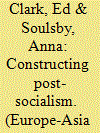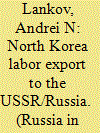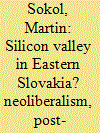| Srl | Item |
| 1 |
ID:
110445


|
|
|
|
|
| Publication |
2012.
|
| Summary/Abstract |
Following the collapse of European state socialism, economists quickly identified a central role for foreign direct investment and Western multinational corporations in moving the region towards a market economy. Knowledge transfers and capital infusions would allow former state-owned enterprises to take on market-economic characteristics and therefore engage more fully in the global economy. This article examines the post-socialist management experience of international joint ventures (IJVs) through a study of the critical events in the life of a German-Czech IJV. The story is told from the local managers' perspective and, drawing on the vocabulary of organisational identity, sense-making and sense-giving actions, we show how the IJV process is constrained and enacted by the post-socialist context.
|
|
|
|
|
|
|
|
|
|
|
|
|
|
|
|
| 2 |
ID:
174879


|
|
|
|
|
| Summary/Abstract |
The export of North Korean labor to Russia began in 1946 and continued, almost uninterrupted, until recently. The arrangements behind this labor migration project underwent dramatic revision from time to time, so we have to speak about three different periods: recruitment of North Koreans for work in fisheries in the 1940s and 1950s, dispatch of heavily controlled logging teams in the 1960s-1990s, and work of North Korean building crews, mainly on an autonomous basis, since the late 1990s. These periods reflect the way relations between the two states have been developing, and the change of their political concerns and interests. However, the underlying rationale has not changed much over the decades: the Soviet/Russian state needed cheap and docile labor, while the DPRK needed an additional source of hard currency and North Koreans were enthusiastic about getting lucrative job opportunities. On balance, both sides have been able to get what they hoped to get, and this has ensured the project’s long life.
|
|
|
|
|
|
|
|
|
|
|
|
|
|
|
|
| 3 |
ID:
122823


|
|
|
|
|
| Publication |
2013.
|
| Summary/Abstract |
The essay critically examines the prospect of emulating a Silicon Valley-style regional development in the post-socialist context of East-Central Europe. It underlines the problematic nature of the Silicon Valley concept itself and examines the way in which the concept has been 'domesticated' in Košice, a peripheral region in eastern Slovakia undergoing a painful post-socialist transformation towards the market economy. In doing so, the essay also highlights links between neoliberalism, post-socialism and the knowledge-based economy.
|
|
|
|
|
|
|
|
|
|
|
|
|
|
|
|
| 4 |
ID:
140240


|
|
|
|
|
| Summary/Abstract |
This paper investigates how tour guides position themselves in Vietnam's transition from a command economy to market socialism. The case study of the Dalat Easy Riders motorcycle guides demonstrates that tour guides take advantage of, personify and contribute to the economic, political and social transitions in the country. Relatedly, we argue that Vietnam's transition (known as đổi mới) is a key component of the Easy Riders' promotional narratives. In sum, we analyse how tour guides become tourist products in a transitional society.
|
|
|
|
|
|
|
|
|
|
|
|
|
|
|
|